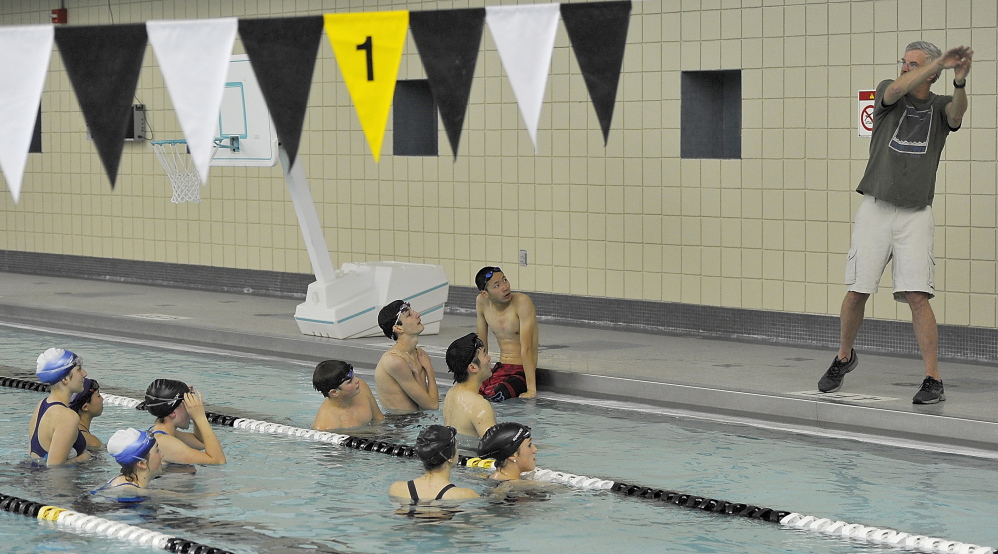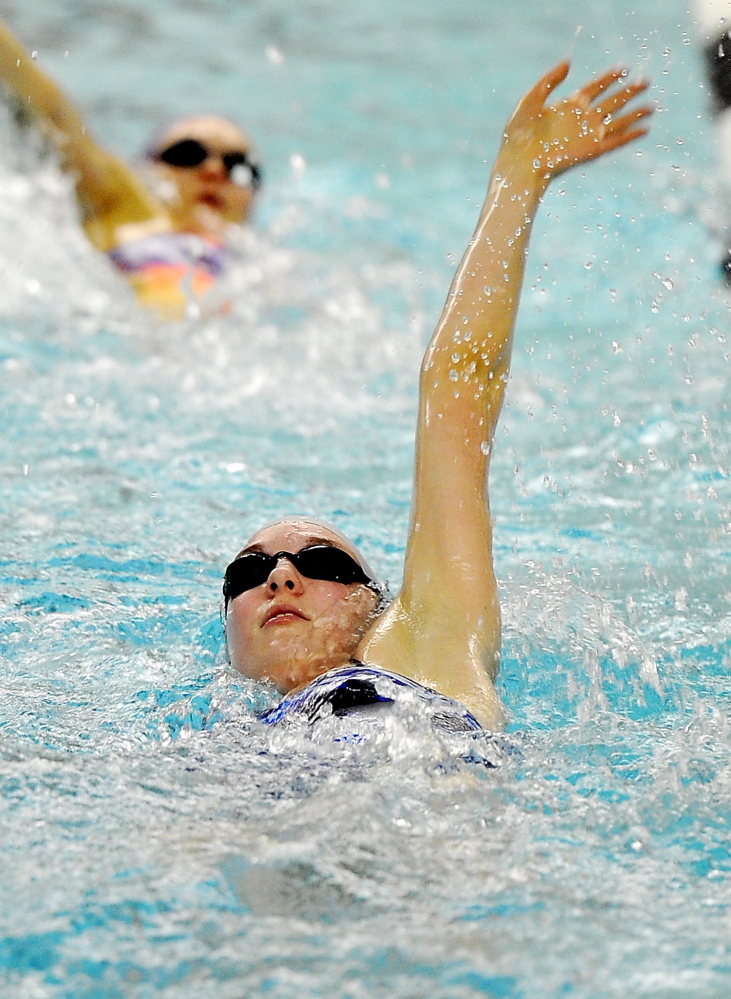The practice laps all blend together. Even the dual meets and the personal-best times tend to fade from memory over the years, but one thing Sarah Rubin will never forget about her experience as a high school swimmer is the feeling of standing on the starting blocks at the state championship meet, at night, in a loud and crowded natatorium.
Only 16 swimmers advanced from the morning trials to the evening finals – first the consolation heat, and then the final eight swimmers competing for a state championship.
“That was 20 years ago,” Rubin said. “And it is probably my single most vivid memory of high school.”
Sadly, she said, the Deering High swimmers she now coaches will no longer experience that same jolt of electricity.
The Class A and B swimming and diving state championships in February will use timed finals, meaning the winner may not be the person who touches first in the highest-seeded heat. The meets will begin in mid-morning and end by mid-afternoon.
There will be no evening finals.
“There cannot possibly be the same energy in a daytime timed finals meet as there is in a prelims/finals style meet,” Rubin said. “Can you imagine moving the state basketball tournament from the (Cross Insurance Arena) to a high school gym? It just wouldn’t be the same experience for the athletes.”
Rubin understands the reasons behind the change. It saves thousands of dollars in facility rentals and the host colleges – Bowdoin and the University of Maine – no longer need to give up their pools for nearly two full days.
“That doesn’t make it any less of a disappointment,” Rubin said.
Jack Hardy, director of athletics at North Yarmouth Academy and chair of the Maine Principals’ Association swim committee, said Bowdoin officials had urged the MPA in 2013 to consider timed finals and after last February’s championships sent a letter saying “they weren’t interested in hosting again unless we could cut back the hours and do a timed finals.”
Because of a snowstorm that made travel hazardous, the 2014 Class B boys state meet was shortened to timed finals.
“Most of the coaches were understanding, but we did upset a few of them,” Hardy said. “The meet itself had a great feel.”
The committee made a change to diving, because fewer schools have access to boards and qualified coaches. Now, only one diver per school receives points for his or her team. Other divers from the same team receive individual medals, but don’t displace divers from other schools for purposes of scoring.
Last winter in Class B, only three boys from two schools (Orono and Mt. Desert Island) qualified for the state meet in diving. For girls, there were six divers from three schools (MDI, Cape Elizabeth and John Bapst). Qualifying divers in Class A were more plentiful, with eight girls from six schools and 12 boys from seven schools.
Brunswick Coach David Bright said he currently has five boys and six girls training with Dragons diving coach Minter Molello.
“Unfortunately,” Bright said, “some divers who may be among the top in the state will be prevented from contributing to team scoring.”
Although the scoring change likely will benefit Greely Coach Rob Hale, who has a pool without a diving board and no current divers, he’s not in favor of it.
“It’s one of the events,” he said. “So I don’t think it should be treated differently.”
Historically, Hale said, only a few overall titles have been decided by diving. None of last winter’s team champions would have changed under the new format.
Coaches have offered other alternatives, including holding the state meets at smaller venues, perhaps with an additional classification so that A, B and C meets could be run with both boys and girls on the same day.
Bright said his swimmers are disappointed to lose the traditional trials and finals.
“All felt it made for an exciting format,” he said, “and brought out the best performance in the athletes.”
Another benefit of morning trials is the opportunity to involve more swimmers in relays, said Cape Elizabeth Coach Ben Raymond, who often rested his faster swimmers until evening finals if they had tough individual races.
“It just added another level of strategy as a coach,” he said.
The Capers clinched the 2013 Class A girls state title when Charlotte Sawyer, a senior seeded 20th, cut 3 seconds off her best time in the morning swim to grab the last spot in 100 breast stroke consolation, then dropped three more seconds in the evening to win from Lane 1.
“I am sure that is one of Charlotte’s best memories of high school,” Raymond said. Under the new format, “she would not have that opportunity to move up.”
The change, Raymond said was not in the best interest of high school swimmers or the sport in general.
“Hopefully,” he said, “the MPA will see the error and correct it.”
Copy the Story LinkSend questions/comments to the editors.





Success. Please wait for the page to reload. If the page does not reload within 5 seconds, please refresh the page.
Enter your email and password to access comments.
Hi, to comment on stories you must . This profile is in addition to your subscription and website login.
Already have a commenting profile? .
Invalid username/password.
Please check your email to confirm and complete your registration.
Only subscribers are eligible to post comments. Please subscribe or login first for digital access. Here’s why.
Use the form below to reset your password. When you've submitted your account email, we will send an email with a reset code.